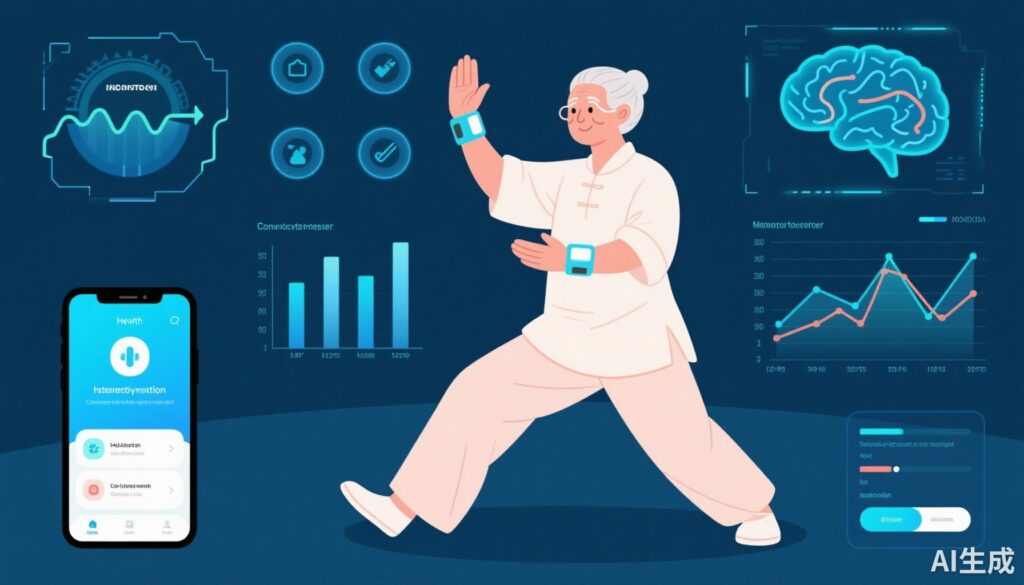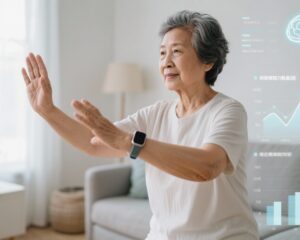Highlights
- Randomized controlled trials demonstrate that Tai Chi significantly improves global cognitive function in older adults with type 2 diabetes mellitus (T2DM) over fitness walking and usual care.
- Wearable device integration within a mobile health (mHealth) framework enables objective monitoring of physical activity, sleep quality, and glucose levels, elucidating mechanisms underlying cognitive improvements.
- Tai Chi also enhances specific cognitive subdomains such as executive function and visuospatial abilities, as assessed by Montreal Cognitive Assessment (MoCA) subtests and Trail Making Test Part B (TMT-B).
- Longer-term trials suggest Tai Chi improves balance and reduces fall risk, contributing to overall health benefits in this population with mild cognitive impairment (MCI).
Background
Type 2 diabetes mellitus (T2DM) is a major chronic metabolic disorder with rising global prevalence, particularly affecting older adults. T2DM is associated with an increased risk of cognitive decline and progression to mild cognitive impairment (MCI) or dementia, substantially impacting quality of life and healthcare utilization. Cognitive deficits frequently affect executive function, attention, and memory in this population. As pharmacologic options for cognitive impairment remain limited, nonpharmacologic interventions such as exercise are increasingly emphasized. Traditional aerobic exercise like fitness walking has recognized cognitive benefits; however, mind-body exercises such as Tai Chi may confer additional neurocognitive and psychosomatic advantages. Moreover, the COVID-19 pandemic and other barriers have amplified the role of telemedicine and mHealth models in delivering home-based therapeutic exercise programs for older individuals with T2DM.
Key Content
Summary of Randomized Controlled Trials Using Wearable Devices and mHealth Models
Recent RCTs (2023–2025) have rigorously evaluated the effects of Tai Chi on cognitive function in older adults with T2DM and MCI. These trials utilized wearable physiologic monitoring and mobile health applications to monitor adherence, physical activity intensity, sleep parameters, and continuous glucose levels, thereby enabling detailed mechanistic insights.
- Chen et al. (2025) conducted a 12-week randomized controlled trial in which older adults with T2DM were randomized 1:1:1 to receive usual diabetes care, supervised fitness walking, or Tai Chi practice conducted via live video streaming under expert guidance. All participants underwent continuous glucose monitoring (CGM) using Guardian Sensors 3 and wore bracelets capturing heart rate, sleep quality, and step count. The primary outcome was change in global cognition assessed by the Montreal Cognitive Assessment (MoCA). Secondary measures included cognitive subdomain tests (e.g., Trail Making Test Part B [TMT-B]), blood metabolic indices, and sleep parameters.
Results demonstrated that the Tai Chi group achieved a significant improvement in MoCA scores (mean difference increase from 21.42 to 23.83; P=0.03), outperforming fitness walking (non-significant improvement) and usual care groups, with statistically significant differences between Tai Chi and fitness walking in MoCA change (P<0.05). Improvements extended to executive function and visuospatial domains, as evidenced by better TMT-B performance and Memory Quotient (MQ) scores in the Tai Chi group compared to fitness walking (P=0.001). Tai Chi also significantly enhanced sleep quality metrics.
- Wang et al. (2025) reported secondary analyses from a multicenter 24-week RCT in China comparing Tai Chi Chuan, fitness walking, and control in adults aged ≥60 with T2DM and MCI. Tai Chi participants showed superior gains in balance function (Timed Up and Go [TUG]-cognitive motor, One Leg Standing Test, Functional Reach Test) and fall efficacy scale scores at 36 weeks follow-up compared with fitness walking, aligning with cognitive benefits and suggesting integrated neuromotor improvements. Additionally, Tai Chi participants experienced fewer falls over the study period.
- Li et al. (2023) performed a 24-week RCT with 36-week follow-up to evaluate Tai Chi Chuan vs. fitness walking vs. control in older adults with T2DM and MCI. Tai Chi participants exhibited significantly greater improvement in global cognitive function (MoCA) at 36 weeks compared to fitness walking (mean difference 0.84 points; P=0.046). Adjustments for lifestyle factors confirmed robustness. Safety profiles were favorable without significant adverse events.
Mechanistic Insights: Role of Sleep, Physical Activity, and Glycemic Control
Wearable devices enabled objective capture of sleep quantity and quality, heart rate variability, daily activity levels, and continuous glucose profiles. Tai Chi was associated with enhanced sleep efficiency and duration compared to fitness walking and usual care, potentially mediating cognitive gains through restorative nocturnal processes. Physical activity analysis revealed that Tai Chi promoted moderate-intensity exercise with mental focus and mindful movements that may enhance neuroplasticity distinctively from aerobic walking. Continuous glucose monitoring showed stable glucose control across groups, suggesting that cognitive improvements were linked to exercise-related neurobiological mechanisms rather than short-term glycemic variation.
Comparative Advantages of Tai Chi Over Fitness Walking and Usual Care
The evidence suggests that Tai Chi is more effective than traditional aerobic walking in improving not only global cognition but also specific cognitive facets like executive function and visuospatial skills, linked to the practice’s combined physical, cognitive, and meditative components. Tai Chi’s low-impact, mindful movements enhance neuromotor coordination and balance, reducing fall risk. Usual care consisting of standard diabetes education yielded minimal cognitive improvement.
Methodological Advances and Use of Mobile Health Technology
Integration of telemedicine platforms and wearable monitoring devices in these RCTs facilitated remote supervised exercise delivery, adherence tracking, and real-time physiological data acquisition. This mHealth approach is particularly advantageous for older adults with mobility constraints or geographic barriers, enhancing the scalability and accessibility of effective interventions like Tai Chi.
Expert Commentary
The converging evidence from these rigorously designed RCTs highlights Tai Chi as a promising mind-body exercise modality for cognitive protection in older adults with T2DM and MCI. The combination of physical activity, cognitive engagement, and meditative elements may synergistically promote neuroplasticity, cerebral blood flow, and stress reduction. The use of validated sensitive cognitive instruments like MoCA and TMT-B ensures detection of subtle early cognitive changes, critical in this population.
The wearable device-based mHealth model represents a meaningful advance, enabling objective dose monitoring and mechanism exploration through sleep and activity metrics. Despite promising findings, limitations include relatively short intervention durations (12–24 weeks in primary RCTs) and variability in Tai Chi style protocols. Longitudinal studies with larger sample sizes and mechanistic biomarkers (e.g., neuroimaging, inflammatory markers) could further elucidate pathways.
Current clinical guidelines acknowledge physical activity as a cornerstone in diabetes and cognitive health, but specific recommendations for Tai Chi remain emerging. Clinicians should consider incorporating Tai Chi, particularly in individuals with mobility limitations or high fall risk, as part of holistic diabetes care with cognitive preservation intent.
Conclusion
Tai Chi presents a compelling, accessible, and effective exercise intervention to improve cognitive function and sleep quality in older adults with T2DM and MCI. Evidence from recent randomized trials incorporating wearable technology and mHealth delivery models demonstrates its superiority over fitness walking and usual care in enhancing global and domain-specific cognition. Integration of telemedicine and wearable monitoring facilitates personalized exercise programs with real-time adherence and physiologic feedback, optimizing therapeutic outcomes.
Future research should focus on longer-term outcomes, underlying neurobiological mechanisms, and broader implementation strategies in diverse populations. These advances underscore the potential of Tai Chi as a key component in multidisciplinary approaches targeting cognitive decline prevention in aging individuals with T2DM.
References
- Chen XS, Liu HZ, Fang J, et al. Effects of Tai Chi on Cognitive Function in Older Adults With Type 2 Diabetes Mellitus: Randomized Controlled Trial Using Wearable Devices in a Mobile Health Model. J Med Internet Res. 2025;27:e77014. doi:10.2196/77014. PMID: 40957073. PMCID: PMC12440321.
- Wang X, Li Y, Huang Y, et al. Effects of Tai Chi Chuan on balance function in adults 60 years or older with type 2 diabetes and mild cognitive impairment in China: A secondary analysis of a multi-center randomized clinical trial. J Diabetes Investig. 2025;doi:10.1111/jdi.70138. PMID: 40820574.
- Li J, Zhang L, Chen R, et al. Effects of Tai Chi Chuan on Cognitive Function in Adults 60 Years or Older With Type 2 Diabetes and Mild Cognitive Impairment in China: A Randomized Clinical Trial. JAMA Netw Open. 2023;6(4):e237004. doi:10.1001/jamanetworkopen.2023.7004. PMID: 37022680.


